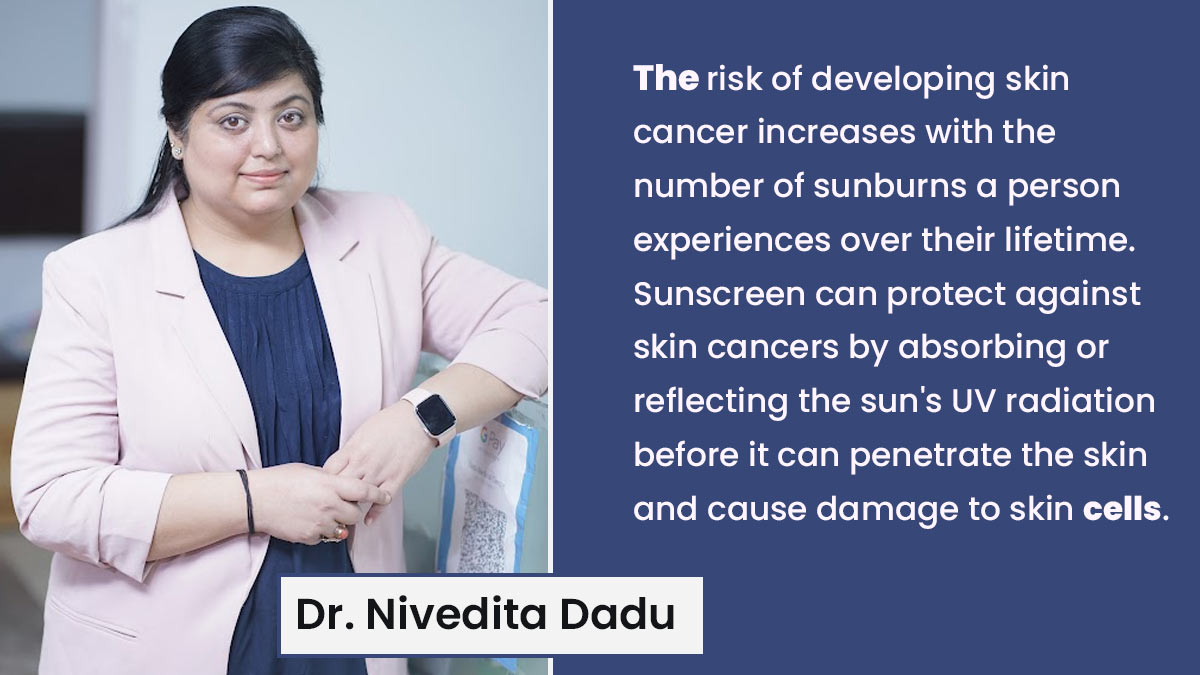Views: 0

Earlier this month, Hollywood actor Hugh Jackman took to social media to update his fans and followers about his health. With a bandaged nose, the 54-year-old shared that he had undergone two biopsies for basal cells, which, according to the actor, is the least dangerous among all types of skin cancers. However, that wasn’t all. The Wolverine actor advocated for sunscreen, asking his audience to apply some on, as summer approaches. “Please wear sunscreen,” he says. “It is just not worth it. No matter how much you want to tan, trust me… This is all stuff that happened 25 years ago. It’s coming out now.”
A few days later, after his biopsy results were negative, he reminded his fans “to wear sunscreen with a high level of SPF (no matter the season)”.
In conversation with Only My Health, Dr Nivedita Dadu, renowned dermatologist, founder and chairman of Dadu Medical Centre, talks about the ill-effects of sunburn and reveals whether sunscreen helps reduce the risk of skin cancer?
Also Read: Nutricosmetics: Novel Way To Enhance Skin & Health
Can Sunburn Lead To Cancer?

Dr Dadu says, “Sunburn can increase one’s risk of cancer.” According to her, sunburn is a sign of skin damage caused by exposure to ultraviolet (UV) radiation from the sun. When the skin is exposed to too much UV radiation, it can cause DNA damage in skin cells, leading to skin cancer.
The risk of developing skin cancer increases with the number of sunburns a person experiences. Sunburns, particularly in childhood or adolescence, can significantly increase the risk of developing skin cancer later in life.
Therefore, Dr Dadu advises people to protect their skin from UV radiation. This can be done by wearing protective clothing, using sunscreen, seeking shade during peak hours of sun exposure, and avoiding tanning beds. In addition, regular skin exams by a dermatologist can also help detect skin cancer early when it is most treatable.
Does Sunscreen Protect Against Skin Cancer?
Given the rising number of skin cancer cases, the recent hype around sunscreen is justified. According to the World Health Organization (WHO), between 2 and 3 million non-melanoma skin cancers and 132,000 melanoma skin cancers occur globally each year. The World Cancer Research Fund shares that skin cancer is the 13th most common cancer in men and the 15th most common cancer in women.
Answering the question around whether sunscreen can protect against skin cancer, Dr Dadu says, “Sunscreen can protect against skin cancers by absorbing or reflecting the sun’s UV radiation before it can penetrate the skin and cause damage to skin cells.”
The Best Type Of Sunscreen

When it comes to sunscreen, we first look out for the Sun Protection Factor (SPF). “SPF is a measure of a sunscreen’s ability to protect against UVB radiation, which is the main cause of sunburn and a significant contributor to skin cancer. The SPF number on a sunscreen indicates how long the sunscreen will protect your skin from UVB radiation compared to how long it would take to burn without sunscreen,” Dr Dadu explains.
“However, SPF only measures protection against UVB radiation and not UVA radiation, which also contributes to skin damage and increases the risk of skin cancer,” she adds. UVA radiation can penetrate deeper into the skin and cause long-term skin damage, while UVB radiation causes sunburn and is the main contributor to skin cancer.
Therefore, the dermatologist advises using a broad-spectrum sunscreen that protects against UVA and UVB radiation. She further recommends reapplying sunscreen every two hours or after swimming or sweating, in addition to other sun protection measures.
Also Read: Want To Remove Makeup Naturally? Use These 6 Ways
Are There Any Side Effects Of Sunscreen?
Applying sunscreen is said to protect against several skin problems. Generally, it is considered safe. However, the doctor says some people may experience mild side effects such as skin irritation, allergic reactions, or acne breakouts.
Providing helpful tips to manage the side effects, she says, “These side effects are usually uncommon and can be minimised by choosing a hypoallergenic or fragrance-free sunscreen that is appropriate for your skin type. In addition, some studies have suggested that certain chemical sunscreen ingredients may have potential health risks, although more research is needed to fully understand these implications. Nonetheless, the benefits of using sunscreen to protect against skin damage and skin cancer far outweigh the potential risks of side effects. If you experience skin reactions or concerns with sunscreen use, consult a dermatologist for personalised recommendations.”
Skin Care Measures To Take

Here are some of the skin-care measures to take:
- Limit your sun exposure during peak sun hours
- Wear protective clothing , such as hats, long-sleeved shirts, and pants, as well as sunglasses to protect your eyes from UV radiation
- Perform regular skin self-exams to check for any changes in your skin
- Avoid tanning beds
- Quit smoking
Bottomline
Anyone can get skin cancer. However, several factors can influence your risk of the disease. Besides taking skin-care measures, it is also important to follow a healthy lifestyle. One must invest in having a balanced diet and indulging in regular exercise. These can help support overall skin health and reduce your risk of skin cancer.


